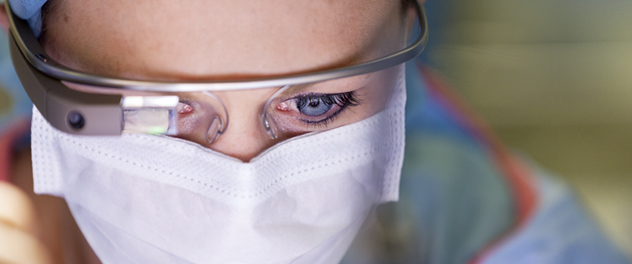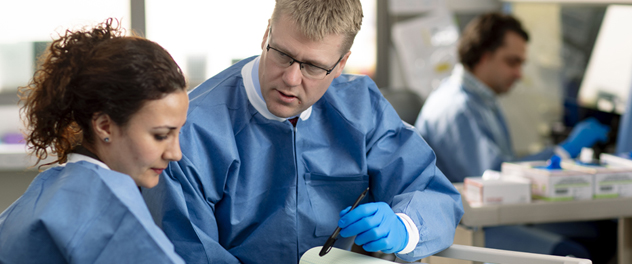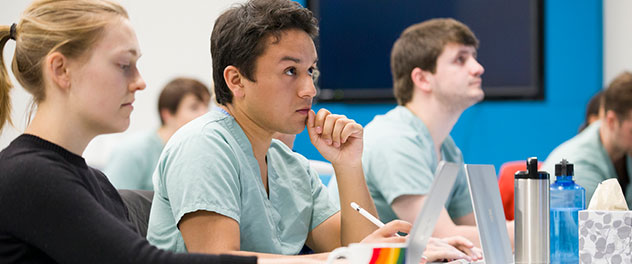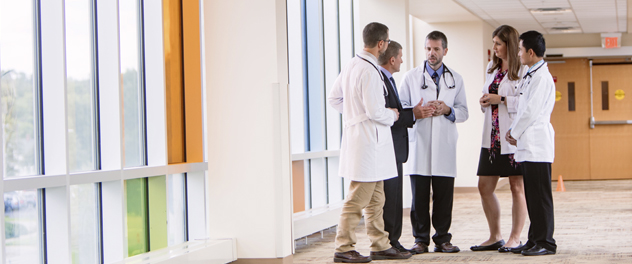-

Focus areas
Specialized teams conduct research and translate discoveries to patient care, addressing needs of patients with diabetes; heart, liver and lung diseases; neurological disorders; skeletal injuries; and congenital anomalies. Learn about focus areas.
-

Shared services
Accelerating the development of innovative treatments, shared services resources enable a wide spectrum of regenerative medicine product and service support functions in-house. Learn about shared services.
-

Education
Drawing on Mayo Clinic's rich teaching and learning environment, the center's academic resources train and prepare future medical professionals in regenerative medicine. Learn about education opportunities.
-

-

Connect
Request a regenerative medicine consultation or appointment, connect with online communities, or search available career opportunities. Learn how to connect with us.
About
People on average are living longer than ever before. In part, this is due to medical advances that have made it possible to save more people from life-threatening diseases, injuries and congenital conditions.
But as people live longer, they're more likely to acquire chronic diseases or develop age-related conditions. Globally, there is an increasing incidence of chronic and degenerative diseases, and nearly 1 in 2 Americans has a chronic medical condition.
After the onset of most chronic diseases or injuries, the damage is there to stay — consider scarring of heart tissue from a heart attack, beta cell dysfunction in diabetes or a spinal cord injury from an accident. Symptoms can be managed, oftentimes with good success, but the underlying tissue or organ damage remains unhealed and can cause complications over time.
To develop new clinical applications that address the unmet needs of these patients, in 2011 Mayo Clinic established the Center for Regenerative Medicine, now called the Center for Regenerative Biotherapeutics.
Mayo Clinic and center leaders believe that regenerative medicine, which makes it possible to actually repair diseased, injured or congenitally defective tissues and organs, will be a vital component of medical and surgical practice in the coming years. By harnessing the potential of regenerative medicine, Mayo Clinic is poised to create new models of health care and transform medicine and surgery.
The future of regenerative medicine at Mayo Clinic
Regenerative medicine is still a relatively new field of practice, representing a paradigm shift from the traditional medical focus of fighting disease to an emphasis on rebuilding health. The Center for Regenerative Biotherapeutics is leveraging its unique expertise, resources and capabilities to create the world's most advanced and innovative ecosystem for the development, manufacture and delivery of novel regenerative biotherapeutics.
Mayo Clinic is focused on a newly refreshed strategy in regenerative medicine — one that emphasizes an enhanced capability for biomanufacturing, with technology platforms supporting the development of new therapeutics known as biologics. Biologics are a new type of "drug" derived from living organisms that have the potential for targeted healing with fewer side effects.
Significant investments in biomanufacturing facilities have enabled Mayo Clinic to build Good Manufacturing Practices facilities on all three Mayo campuses. These facilities meet strict quality controls and regulatory guidelines that are required for manufacturing new biologics. The long-term goal is to have these new types of healing solutions on-site, where they can be used immediately for patients with unmet needs. The Center for Regenerative Biotherapeutics is leading Mayo Clinic's biomanufacturing initiatives across seven prioritized technology platforms:
- Nonmalignant cellular therapies to replace or repair tissues, including induced pluripotent stem cells, mesenchymal stem cells (MSC), MSC-matrix combinations and dendritic cells
- Malignant cellular therapies, such as chimeric antigen receptor (CAR)-cells engineered to target malignancies
- Gene and viral therapies that use genetic engineering and reengineered viruses
- Tissue engineering, which includes 3D printing, biomaterials, and bioengineering for repair and restoration
- Phage-based therapies that use viruses that attack multiple drug-resistant infections
- Extracellular vesicles, which are secreted by natural or engineered cells, and can act as drug, protein or gene transporters
- Synthetic biology, which involves redesigning the functions of organisms to fit medical needs
In addition to developing regenerative medicine therapies for patients, the center is also committed to:
- Training the next generation of clinicians and scientists in the latest regenerative medicine applications
- Offering continuing education opportunities about regenerative medicine to Mayo Clinic faculty and staff
- Educating patients and the public about the promise of and latest advances in regenerative medicine
A unique aspect of the Center for Regenerative Biotherapeutics is that its activities are not just laboratory based or clinic based. They're both — and everything in between. Efforts in each of the center's programs, which build on Mayo's extensive research resources and clinical practice, span the full spectrum of discovery science, translational research and clinical application.
Ultimately, this comprehensive approach means that the Center for Regenerative Biotherapeutics has the ability to turn promising laboratory discoveries into proven treatments — and make them available to patients — more effectively and efficiently than most anywhere else. The center continues to spur innovation to rapidly advance novel regenerative therapies to support Mayo Clinic's 2030 vision to cure, connect and transform care. Read more on the Center for Regenerative Biotherapeutics blog.